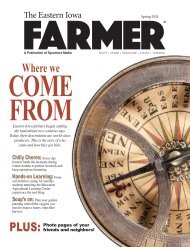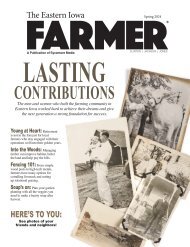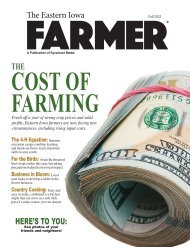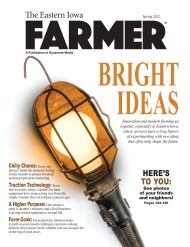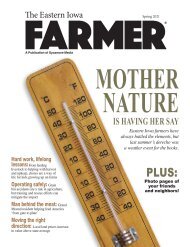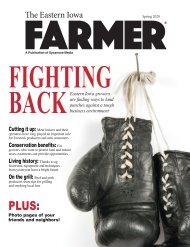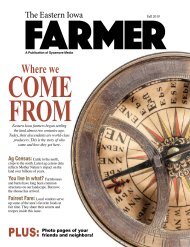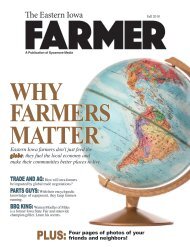Eastern Iowa Farmer Fall 2020
You also want an ePaper? Increase the reach of your titles
YUMPU automatically turns print PDFs into web optimized ePapers that Google loves.
Eloise Tabor Stewart works with her<br />
father-in-law, James Stewart, on the<br />
family’s farm in Preston. Besides driving<br />
a tractor, Eloise did many chores and<br />
particularly liked working with cattle.<br />
Eloise drives the tractor while James<br />
mans the oat binder.<br />
Eloise Tabor Stewart,<br />
right, poses with one<br />
of her friends in the<br />
flapper-style clothing<br />
that was popular in<br />
the 1920s.<br />
(Below) Amelia<br />
MacDonald Cutler<br />
authored this suffrage<br />
handbill, “Six Reasons<br />
Why <strong>Farmer</strong>s’<br />
Wives Should Vote.”<br />
Courtesy of the Virginia<br />
Commonwealth<br />
University Libraries.<br />
<strong>Eastern</strong> <strong>Iowa</strong> <strong>Farmer</strong><br />
photos / Contributed<br />
decades later ran a farm herself after<br />
being widowed, drove that car to town<br />
the same year the 19th Amendment to the<br />
U.S. Constitution passed giving women<br />
the right to vote. Rural <strong>Iowa</strong> played a<br />
role in that pivotal moment in history.<br />
Political roots<br />
Eloise’s father, George Washington<br />
Tabor, was a state senator from 1929<br />
to 1933 when he lost the Democratic<br />
primary to Carolyn Campbell Pendray,<br />
who was from Maquoketa.<br />
In a letter to Eloise after the election<br />
her mother wrote, “Your dad<br />
didn’t like being beat by a woman.<br />
He went to bed for three days.”<br />
Not only was Pendray the<br />
first woman elected to the state<br />
Legislature (she was sworn into<br />
the <strong>Iowa</strong> House in 1929), she<br />
later became the first woman to<br />
preside over the <strong>Iowa</strong> Senate,<br />
pointed out Linda Stewart, who<br />
is married to Eloise’s grandson<br />
Tom.<br />
“Carolyn Pendray was a<br />
pioneer,” Linda said.<br />
While Eloise never ran for<br />
office, her brother, Howard,<br />
and her son, Roger, both served in the<br />
<strong>Iowa</strong> Legislature. A lifelong Democrat,<br />
she lobbied on behalf of Farm Bureau<br />
Women and never missed an election.<br />
“She took her voting rights very seriously,”<br />
said Jennie, who is the family historian.<br />
Even when macular degeneration<br />
robbed her of most of her eyesight, “she<br />
insisted on me getting her to the polls.”<br />
And exercising that right can be partly<br />
traced to another young girl in rural <strong>Iowa</strong>.<br />
A leader emerges<br />
Years before Eloise drove that car, future<br />
suffrage leader Carrie Chapman Catt<br />
had a ringside seat to spirited, dinner-table<br />
political conversations at the family<br />
farm outside of Charles City, <strong>Iowa</strong>.<br />
“Her experience on the farm is where<br />
she became a suffragist. Her family talked<br />
politics. They were great fans of Horace<br />
Greely,” said Karen Kedrowski, director<br />
of the Carrie Chapman Catt Center for<br />
Women and Politics and professor of political<br />
science at <strong>Iowa</strong> State University.<br />
Greely, a newspaper editor and publisher<br />
active in politics, ran for president<br />
eifarmer.com fall <strong>2020</strong> | <strong>Eastern</strong> <strong>Iowa</strong> <strong>Farmer</strong> 13



